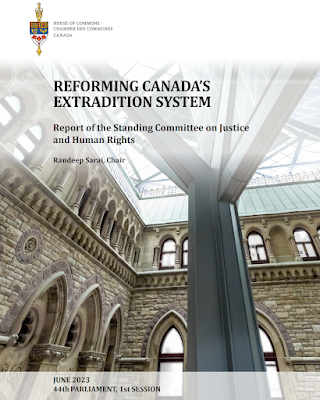I just got back from the annual conference of the Canadian Association of Law Libraries in Hamilton, Ontario (conference program).
Not surprisingly, a lot of attention was devoted to the topic of artificial intelligence.
The opening keynote talk was given by Prof, Teresa Scassa of the University of Ottawa on “Regulating AI in Canada: Bill C-27 and the AI and Data Act”.
It just so happens that the current issue of the Canadian Bar Review has published an article of hers on the topic of her presentation:
"Canada’s Bill C-27, The Digital Charter Implementation Act, includes a proposed Artificial Intelligence and Data Act (AIDA). If passed, the AIDA would establish a series of obligations regarding the use of anonymized data in AI systems; the design, development and making available for use of AI systems generally; and the design, development and making available for use of high-impact AI systems. The bill is challenging to fully understand, as many of these obligations are left to be fleshed out in regulations, including even the definition of the “high impact” AI, to which the AIDA will apply. Oversight of the regime will be the responsibility of the Minister of Industry, who is also responsible for supporting the growth of the AI industry in Canada."
"This paper analyzes the AIDA and the context into which it was introduced. This context includes a rapidly evolving AI landscape, as well as important governance initiatives emerging internationally, including from the European Union and the United States. It also explores a set of constraints on Canadian law and policy developments in this space. Part 2 considers how the AIDA is meant to be both ‘agile’ and a form of risk regulation, and it measures the AIDA against these concepts. In Part 3, the paper considers the scope of the AIDA and a few of the particular constraints that shaped it. These include: the cross-sectoral nature of AI technology, Canada’s constitutional division of powers, and the Canadian tendency to address public and private sector actors separately. Together, the two parts of the paper provide a view of the context and constraints that have shaped the AIDA, casting light on some of the challenges faced in regulating AI, and surfacing important issues for the consultation and engagement that is necessary to properly regulate AI in Canada."
It is possible to follow the progress of the bill through the houses of the Canadian Parliament on the LEGISinfo website.
Another interesting article (forthcoming) is Mapping Artificial Intelligence Use in the Government of Canada by Paul Daly, also a University of Ottawa professor:
"On the one hand, technological advances and their enthusiastic uptake by government entities are seen as a push toward a Canadian dystopic state, with friendly bureaucrats being replaced by impassive machines. On the other hand, embracing technology is considered a confident move of the Canadian administrative state toward an utopian low-cost, high-impact decision making process."
"I will suggest in this paper that the truth—for the moment, at least—lies somewhere between the extremes of dystopia and utopia. In the federal public administration, technology is being deployed in a variety of areas, but rarely, if ever, displacing human decision making. Indeed, technology tends to be leveraged in areas of public policy that don’t involve any settling of benefits, statuses, licenses, and so on."
"We are still a long way from sophisticated machine learning tools deciding whether marriages are genuine, whether tax payers are compliant or whether nuclear facilities are safe. The reality is more down to earth."
Labels: government of Canada, IT trends, legislation





